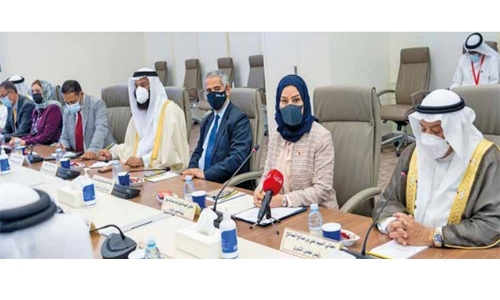Bahrain inter-parliamentary meeting considers doubling tax to 10% to boost revenue
TDT | Manama
The Daily Tribune – www.newsofbahrain.com
An inter-parliamentary meeting on economic and financial recovery yesterday mulled adjusting the Value-Added Tax (VAT) percentage in the Kingdom to enhance government revenue and deal with the requirements of the next stage amid the repercussions of the COVID-19 pandemic.
The meeting also mulled ways to cut spending and bring the Kingdom’s budget back into balance by 2024.
There is, however, no official confirmation on what the new VAT will be or when it comes into force.
Reuters, quoting a Bahraini parliamentary source, said the Kingdom is considering doubling value-added tax to 10% to boost state revenue and reduce the budget deficit.
The report also said the Kingdom is discussing amending the law on 5% VAT introduced in 2019.
Parliament must approve such a change in the law, the report quoting the source said.
“Other solutions to boost state finances were also being considered,” the source added.
The government, the source said, was trying to find ways to protect people with low incomes should the change be made.
To exclude 94 food commodities, 1,400 services Meanwhile, the parliamentary and government representatives headed by Representatives Council Speaker Fawzia bint Abdullah Zainal said they would ensure the exclusion of 94 food commodities and 1,400 government services from VAT. The meeting, however, didn’t say what the rate of the VAT they are aiming to reach.
The current rate is 5%.
Finance and National Economy Minister Shaikh Salman bin Khalifa Al Khalifa said that the government is committed to achieving the objectives of the fiscal balance programme.
The government, he said, had begun to rationalise and enhance expenditure efficiency, reduce operating expenses, and maintain social support for eligible citizens.
“The priority for the next stage is recovering the national economy through implementing initiatives that are consistent with the requirements of the current situations, which calls for determination,” the minister said.
“The results achieved in confronting the virus showed everyone what we could achieve if challenges are faced together in the spirit of one Bahrain.”
Exceeded interim goals The inter-parliamentary meeting also confirmed, citing the results achieved until February 2020, that the Fiscal Balance Programme had exceeded its interim goals.
“However, that didn’t continue due to the repercussions of the coronavirus pandemic, which now calls for adopting initiatives to protect the society through economic recovery and enhancing financial stability.”
New initiatives, the committee said, are also required to put the fiscal balance programme back on track and avoid any direct impact on citizens.
It also confirmed that the fiscal balance programme will have its goals modified to 2024.
The meeting hailed the performance of the Kingdom in economic indicators, especially in the real estate sector, international exports of national origin products, national employment programmes and tourism, amongst others.
Mahmoud Al Bahrani, Chairman of the Financial and Economic Committee in the House of Representatives, said the exceptional circumstances brought forth by the coronavirus (COVID-19) pandemic requires all of us to unite and stand together to reach the desired economic recovery.
New initiatives, he said, are required to reach a balance between government expenditures and revenues.
He, however, said that the options presented regarding VAT should not affect the citizens or low-income groups.
$530 million stimulus Pandemic stimulus introduced by the government, including doubling the liquidity support fund to BD200 million ($530 million), central bank-enabled loan deferrals, reduced reserve requirements for banks and relief on utility bills, had helped to get the economy back on track, Bloomberg quoting a Bahraini official said.
The Kingdom may also look at selling stakes in some of its energy and infrastructure assets as a way to raise new sources of income, Oil Minister Mohammed bin Khalifa Al Khalifa said in an interview with Bloomberg in May.
The International Monetary Fund had projected that the Kingdom’s budget shortfall would drop to 9.1% of gross domestic product this year from 18.3% of GDP in 2020.
Bahrain bouncing back Bloomberg report also points out that the Kingdom, like many other countries, is bouncing back from the impacts of the pandemic, with its Real GDP growth reached 5.7% year-on-year in the second quarter while real non-oil growth hit 7.8% during that same time.
Related Posts

